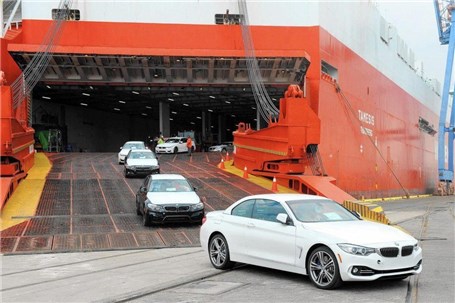
- Saturday 15 July 2017 - 15:58:00
Iran Government to Choke Auto Imports?
Asre Khodro - The Ministry of Industries, Mining and Trade has announced a proposal, the implementation of which is certain to tighten the grip of Iran Khodro and SAIPA, the largest state-controlled automakers, on the domestic market.
Reporting "Asre Khodro", the ministry has proposed that auto importers invest twice the value of imported cars in local firms, or they will not be allowed to bring foreign cars into the country.
The proposal is currently being studied by the administration of President Hassan Rouhani. After earning the Cabinet’s approval, the proposal will be forwarded to the parliament for the final ratification.
Hurdles and Spears
In case the proposal gets the parliament’s go-ahead, it is certain to become another hurdle in the way of auto imports.
Given the environmental woes of Iran exacerbated largely by car emissions, encouraging the joint production or import of hybrid and electric vehicles can help reduce air pollution in metropolises and should top the ministry’s agenda.
If the ministry succeeds in choking car imports, Iranians will never see Toyota’s Prius, for instance, on their roads. The car has won accolades such as, “Car of the Year Japan Award” and “Best Green Car of the Year”. This, unfortunately, is not a priority of the ministry.
According to the ministry, the proposal is aimed at pushing foreign carmakers with major shares in Iran’s automotive market to invest more in the domestic industry.
The proposal includes three clauses that are as follows:
The first clause, which is in line with the previous mandates issued by the ministry, requires all auto importers to offer after-sales services.
Accordingly, the auto importers are required to have a direct deal with the foreign producer or its regional representative. This will put an end to the revival of gray vehicle imports.
Gray imports of vehicles include new or used motor vehicles and motorcycles legally imported from another country through channels other than the manufacturer’s official distribution system.
Last winter, authorities in Tehran, banned the gray import of vehicles and deprived the sector of almost half the resources and channels used for auto imports.
A New Monopoly
The second clause of the proposal suggests that foreign firms should be allowed to only have a single deal with one Iranian firm, which means that, for instance, Peugeot, which has a joint production deal with Iran Khodro, will not be allowed to bring cars into the country through a different partner.
This will reduce the number of companies allowed to import vehicles drastically since both IKCO and SAIPA have joint production deals with the same foreign firms.
The two companies have almost a 90% share of the local auto market. Handing them exclusive import rights of several brands will certainly tighten their stranglehold over and curb competitiveness in the domestic auto industry.
The proposal will increase the two companies’ leverage in pricing, such that they could increase the price of imported vehicles manifold.
Forced Injection of Funds
The ministry has saved the most shocking part in the last clause, based on which auto imports will be conditioned to “contributing to the local production”.
“Auto importers permits will be extended to only those firms that locally produce vehicles, or importers that invest twice the value of the imported car in the local production sector,” the clause reads.
Most of the companies importing vehicles do not have the infrastructure for manufacturing cars and lack the funds required for setting up a local production plant. This could force them to inject funds into the country’s automotive industry.
The two Iranian major auto producers are facing a dire lack of liquidity and according to industry insiders, IKCO and SAIPA owe local parts makers $2.4 billion. Therefore, the ministry’s move could be aimed at helping the two state fund guzzlers help repay their longstanding debts without benefiting the customers.
Experts Comment
Farhad Ehteshamzad, the head of Iran Auto Importers Association, said, “The Rouhani administration has so far tried to limit car importers in order to boost local production.”
Since President Rouhani took office in 2013 and after the lifting of sanctions, many foreign automotive companies—like PSA Group and Renault—have made forays into Iran by forging joint production deals with IKCO and SAIPA.
According to Ehteshamzad, the Industries Ministry is set to further back joint ventures by removing the competition altogether.
He warned that in case the parliament approves the proposal, the range of imported cars offered in Iran will be narrowed down and prices will rise dramatically.
On the other hand, some experts believe local production needs a further “boost” and the move will provide Iranian carmakers with a new lease of life.
However, automotive state companies, which have chronically depended on government support for the last three decades, can neither change tack nor serve customers’ interest.
Considering Iran’s meager share of less than 1% of the international auto market, the notion of forcing major carmakers like Volkswagen and BMW into making investments in the domestic industry is wrong-headed.
Source: financialtribune.com
- Iran Auto Import
- auto import companies
The order to stop the increase in vehicles tariffs is binding
Government must restore previous car import tariffs
The car registration deadline dropped to 3 months
Latest news on reforming car import tariff
The second victim after SEAT on the verge of escaping from Iran
Increasing car imports
The car is topped by major imported items
Iran Has 4% Share in Renault’s Int’l Sales
Renault Exports to Iran Rises by 83%
Details of new rules for importing car to Iran
New government approval for car numbering of imported and localized vehicles
Car imports has been limited
The importers hesitation in the production path
New details of auto importation guidelines and rules and how to collaborate with foreign auto companies.
The car importation order will be blocked until further notice
55% increase in vehicle imports in four months
An increase of nearly 130% of vehicle imports by the end of July
Cars Shipped Through Southern Iran Up 85%
New Directives of Iran Auto Import Released
Controversial Vehicle Price Surge in Iran
IKCO management handed over to consortium of non-governmental shareholders
Iran's government approved car import after four years
$2 Billion Aid Package to Bolster Automotive Industry
Renault sales decline 6.7% in first half of 2019
FIAT cars will be manufactured in Salafchegan, Iran
Car, mobile price fluctuations in Iran puzzling people
IKCO, Azad University Sign R&D Agreement
When will Azerbaijan start producing Peugeot 207?
Iran Annual Auto Output Report: 2018-19
Automotive Industry has exceeded the targets with “Automechanika Istanbul” which the World's 3rd Largest Fair!
Sout Korea’s auto exports down 1.6% in Feb.
Renault to Return to Iran: Deputy Minister
Chery's luxury brand will soon be on the market
Warm start for arrizo6 in Ahwaz







